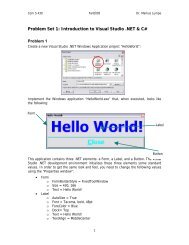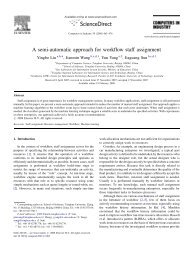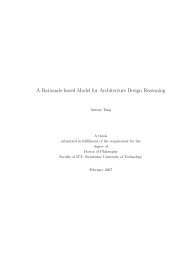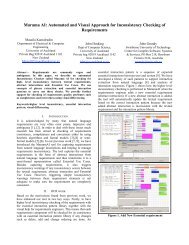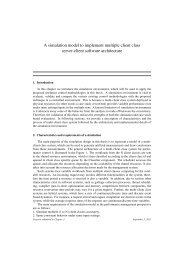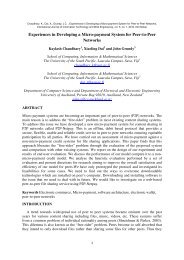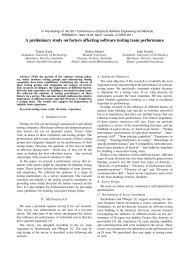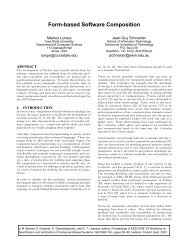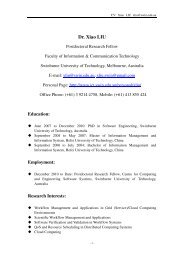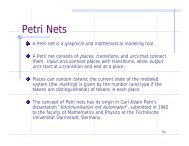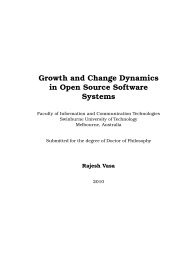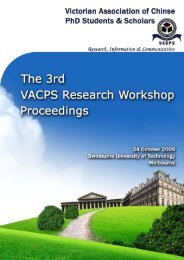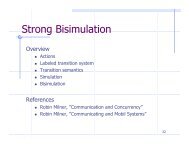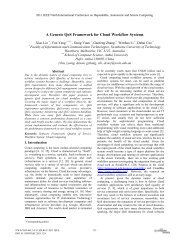Xiao Liu PhD Thesis.pdf - Faculty of Information and Communication ...
Xiao Liu PhD Thesis.pdf - Faculty of Information and Communication ...
Xiao Liu PhD Thesis.pdf - Faculty of Information and Communication ...
Create successful ePaper yourself
Turn your PDF publications into a flip-book with our unique Google optimized e-Paper software.
QoS requirements.<br />
Generally speaking, there are five basic dimensions for cloud workflow QoS, viz.<br />
time, cost, fidelity, reliability <strong>and</strong> security [98]. Time is a basic measurement <strong>of</strong><br />
system performance [1, 2, 49]. For workflow systems, the makespan <strong>of</strong>ten refers to<br />
the total time overheads required for completing the execution <strong>of</strong> a workflow. The<br />
total cost <strong>of</strong>ten refers to the monetary cost associated with the execution <strong>of</strong><br />
workflows including such as the cost for managing workflow systems <strong>and</strong> usage<br />
charge <strong>of</strong> cloud resources for processing workflow activities. Fidelity refers to the<br />
measurement related to the quality <strong>of</strong> the output <strong>of</strong> workflow execution. Reliability<br />
is related to the number <strong>of</strong> failures <strong>of</strong> workflows. Security refers to confidentiality <strong>of</strong><br />
the execution <strong>of</strong> workflow tasks <strong>and</strong> trustworthiness <strong>of</strong> resources. Among them,<br />
time, as a basic measurement <strong>of</strong> performance <strong>and</strong> general non-functional<br />
requirement, has attracted most <strong>of</strong> the attention from researchers <strong>and</strong> practitioners in<br />
the area <strong>of</strong> such as S<strong>of</strong>tware Engineering [84], Parallel <strong>and</strong> Distributed Computing<br />
[44, 71] <strong>and</strong> Service Orientated Architectures [35]. In this thesis, we focus on time,<br />
i.e. we investigate the support <strong>of</strong> high temporal QoS in scientific cloud workflow<br />
systems.<br />
In the real world, most scientific processes are assigned with specific deadlines<br />
in order to achieve their scientific targets on time. For those processes with<br />
deterministic process structures <strong>and</strong> fully controlled underlying resources, individual<br />
activity durations, i.e. the completion time <strong>of</strong> each activity, are predictable <strong>and</strong><br />
stable. Therefore, process deadlines can normally be satisfied through a build-time<br />
static scheduling process with resource reservation in advance [36, 100]. However,<br />
stochastic processes such as scientific workflows are characterised with dynamic<br />
changing process structures due to the nature <strong>of</strong> scientific investigation. Furthermore,<br />
with a vast number <strong>of</strong> data <strong>and</strong> computation intensive activities, complex workflow<br />
applications are usually deployed on dynamic high performance computing<br />
infrastructures, e.g. cluster, peer-to-peer, grid <strong>and</strong> cloud computing [4, 65, 92, 95].<br />
Therefore, how to ensure cloud workflow applications to be finished within specific<br />
deadlines is a challenging issue. In fact, this is why temporal QoS is more<br />
emphasised in large scale distributed workflow applications compared with<br />
traditional centralised workflow applications [1].<br />
In the following sections, we will introduce the current work related to temporal<br />
15



